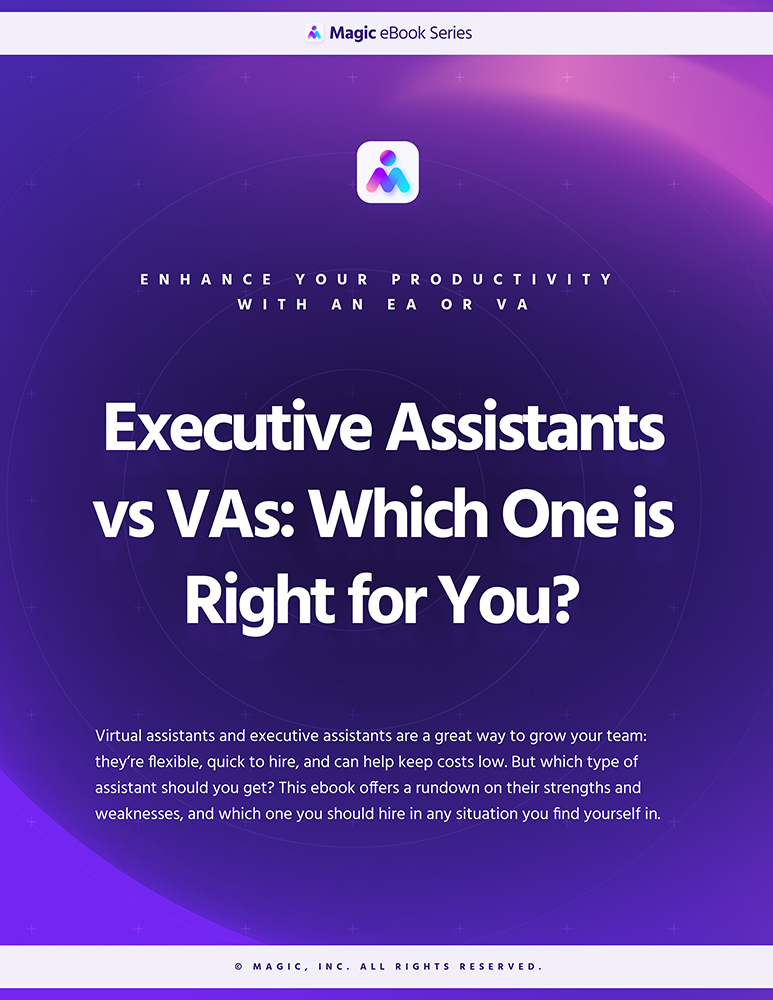Just a few decades ago, you could spot a corporate office by the ranks of assistants filling its desks. These days, with computers handling typing, filing, and other clerical work, fewer people turn to assistants.
Yet they still fill an important role—and executive personal assistants, in particular, are emerging as valuable assets in running a business. Business coach David Finkel distinguishes between a few different types of personal assistants based on how they contribute to a leader’s work.
At one end of the scale are personal assistants who do routine or simple ad hoc tasks. On the other are assistants who assist with executive duties. They observe how you work and adapt to it to improve your professional effectiveness.
The executive personal assistant (EPA) occupies the latter end of the spectrum. They provide support in both professional and personal life—often blurred by virtual work and space—in order to help executives work as effectively and seamlessly as possible. They handle routine work and simple errands but also help their bosses organize, plan, and streamline their working hours for better productivity.
If you find yourself swamped at work, or if things often slip through your fingers, you may just need an EPA. Read on to see how they can improve your day-to-day.
- There are different types of assistants, like personal assistants for routine tasks and executive assistants who provide flexible, high-level support.
- Executive personal assistants lend their support in both personal and professional matters, allowing executives better use of their time across the board.
- People whose work involves filling multiple roles or overseeing simultaneous projects can greatly benefit from an EPA.
The Rise of Executive Personal Assistant Jobs
Executive assistants (EAs) are an open secret in the realm of professional productivity. Many business leaders swear by them, and gurus consider them essential to executive efficacy. And despite being stereotyped as a low-skill role, says long-time EA Bonnie Low-Kramen, EAs are “right arms to leaders, the backbone to companies”.
However, with the rise of hybrid work, many EAs have moved out of the office to render their services remotely. Meanwhile, many of the executives they work with have likewise adopted hybrid habits, where personal and work life often overlap.
Post-pandemic, Low-Kramen says, assistants leverage their skills to fill that gap:
“[They] use their technology skills to facilitate online meetings, their organizational and calendaring skills to adeptly wrangle complicated schedules over numerous time zones, and their people skills to help determine which candidates best fit the culture of their organizations.”
Like personal assistants, EPAs handle day-to-day tasks so their clients can focus on their duties. These include managing records, making reservations and small purchases, and handling travel arrangements.
But like EAs, they also offer high-level support. Executive assistant services involve overseeing and optimizing a client’s schedule, helping with project management, and anticipating and solving problems as they arise.
Benefits of Having a Personal Executive Assistant
Executive personal assistants offer substantial benefits to individual executives, as well as entire businesses. You can look at it this way: by taking work off an executive’s docket, in effect, an EA increases the number of hours their boss can work—but at a fraction of the cost.
For senior executives, the cost savings can be quite substantial. Good assistants boost productivity by nearly 10%, freeing them up from reacting to distractions and empowering them to proactively pursue big-picture goals.
Here are the primary ways that an EPA can improve your work routine.
Streamlined Operational Efficiency
An EPA also provides support by minimizing distractions and frictions, which are often caused by issues in communication or file management. They can serve as a primary point of contact, managing your inboxes to screen incoming messages and help prepare (or proofread) outgoing ones.
An assistant can also delete or defer unimportant messages, flag ones that need your personal attention, and redirect those best answered by other people in your business. Plus, they can help you organize your files, kanbans, or virtual workspaces, making it easier to track projects and find the files you need.
Additionally, executive personal assistants streamline information dissemination, enhancing collaboration and decision-making processes for their clients, ultimately contributing to a more organized and productive work environment.
Amplified Productivity for Executives
One of an EPA’s basic roles is to help an executive make better use of their time. There are two main ways they accomplish this.
The first way is by taking routine tasks off their client’s to-do list. This allows an executive to dedicate more time to their top priorities. Furthermore, by having less to do, they can remain focused for longer periods of uninterrupted time.
The second way is by making high-level adjustments to an executive’s schedule. Calendar management is, in fact, one of the fundamental roles of executive support.
By assessing their client’s priorities, working habits, and constraints, they can establish blocks of time to keep free for focused work while arranging their remaining hours as efficiently as possible among meetings, ad hoc tasks, and other involvements.
Blending these two approaches, EPAs ensure that every minute is utilized effectively, empowering their clients to concentrate on high-impact decisions and long-term goals.
Balancing Work-Life Dynamics for Executives
It is, of course, possible for work to intrude upon personal time and vice versa. An EPA can help you manage both and, perhaps surprisingly, draw better boundaries between the office and the home.
An EPA can set personal appointments, arrange gift deliveries or reservations, and help you plan events or trips, whether personal or professional.
By handling these in your stead, you have more time to focus on work—which means fewer chances of staying later in the office, whether physical or virtual, than you mean to.
Who Needs an Executive Personal Assistant?
Executive assistants are best positioned to provide support to individual business leaders or small groups rather than to entire teams. Here are a few cases where they might serve as a great addition to your team.
C-level Executives and Senior Leaders
Leaders in the C-suite play pivotal roles in a business, and when they get bogged down, it can entangle entire teams. Approvals could get delayed, instructions may be miscommunicated, and projects may fall behind.
Senior managers should get the support they need to keep them on top of their projects, appointments, and correspondences. An EPA can help them stay on track, which in turn guarantees their team receives proper oversight.

Hire an EA or VA to delegate more, stress less, and grow your business.
Learn MoreBusiness Owners and Entrepreneurs
Entrepreneurs, sole proprietors, and founders of SMEs typically take on multiple roles in their business, especially early on. This means that any problems affecting them can have severe effects on the business as a whole (which goes without saying for solo entrepreneurs).
EPAs offer the kind of flexibility and resourcefulness that’s needed to keep up with this sort of multifaceted work. They can handle routine tasks, providing a solid base of support while at the same time assisting with problem-solving and even liaising with important clients or partners.
Busy Professionals with Demanding Schedules
It’s not rare for accomplished professionals to juggle multiple roles: manager, researcher, consultant, and so on. In these sorts of networks of responsibility, it can also be easy to fall behind. Delays in one role can easily affect others, compounding the problem.
In these cases, an EPA can help you sort out your responsibilities based on importance, urgency, and other criteria. They can also be valuable for being unattached to any specific job you have, providing a useful, impartial eye to your overall situation.
Hire an Executive Assistant with Magic
In all, an EPA provides support that spans the personal and professional, which are increasingly blurred in hybrid and remote work. Since they can support you in both spheres, they can help you achieve a valuable work-life balance that empowers you in both aspects of life.
If you or your business is held back by problems in supervision, management, or communication, hiring an assistant may be your best option for support, providing help where it has the biggest impact.
Magic can find you a remote assistant with the skills you need. Tell us what you do and what problems you face, and we’ll find you an ideal candidate within a week. Schedule a call with us today!








